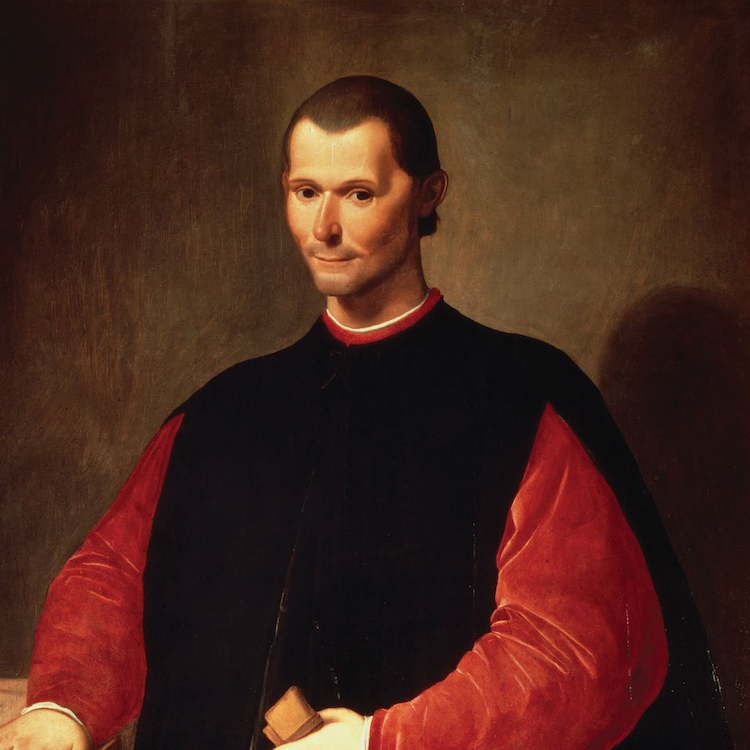Several hundred years before Christ the Confucian Analects gave the world what has come to be known as the Silver Rule, which reads Do not do to others what you do not wish them to do to you. As was Jesus’ whole approach to human behavior, He made it a positive statement that has come down to us as the Golden Rule.
While both of these moral teachings have had the staying power of well over 2000 years, their use has not been as universally accepted or practiced enough to make a deciding difference in the behavior of mankind. One need only look to the writings of Niccolo Machiavelli, who was born in 1469, nearly 1500 years after Jesus to find a rule that has become more the governing principle of nations and their leaders throughout most of human history. His chief guiding principle for politicians and even individuals, which I will call the Iron Rule, was the theme of his seminal work, The Prince, written in 1513.
Machiavelli’s rule for princes stated unequivocally that the ends always justified whatever means he must employ. This heavy metallic rule always seems to trump both the silver and the golden rules. Its universal appeal has made it seriously difficult for decent men to run for or serve in office with honesty and truth.
Most likely an undeclared atheist, Machiavelli was disturbed that most people in the 16th century lived according to the immorality of the day, even though they espoused Christian principles. The precept of Do unto others…had become I must kill you before you kill me. Since the Italians of his day were morally weak, cowards, or poor, traditional rules had to be altered. Machiavelli’s Prince was a realist who had to work with the existing situation. This is akin to the motto of political pragmatism if it works, do it! It seemed futile for him to urge that people just be good and things will be better. While the new Prince should be personally decent and principled, he must never let his principles get in the way of the evil he must do to preserve himself and his reign. This is what many in the United States call practical atheism.
It has been almost five centuries since Machiavelli’s 1527 death. Now most governments tend to stay neutral on personal moral issues. It is obvious that Machiavelli’s spirit has deeply influenced the minds of many current American leaders, who employ the same antinomian rationale that has led the courts to render their decisions on abortion and homosexual rights.
Can anyone argue that this hypocrisy is not still evident right here in River City, USA? Is it not part of the Garden of Eden baggage of man’s fallen nature? Is this not why so many decent people fail to get elected or once elected convert to the Machiavellian ways of the traditional politician. Whom do Americans have to blame for this situation?
When a rare politician has come along preaching sacrifice and belt-tightening, have the American people listened to him? Are we not more likely to vote for the person who promises the most with the least cost to ourselves? The American people, many Catholics included, are part of the problem, not its solution.
Rationalization is an essential part of man’s fallen nature. How much bad behavior is excused by saying, well, I am just human. While this phrase has become synonymous with sinfulness, it is used more as an excuse and not a self-rebuke. We see it in our politicians and we see it in our daily lives. How many wars have been justified by the iron rule of Machiavelli? Even the good war that brought the Nazis to justice was sullied by Russian participation at Nuremberg. The names Dresden, Hamburg, Hiroshima, and Nagasaki were erased from the map by the rule of iron, not that of gold or silver. Even the exceptions to the rules, a just war, killing in self-defense and when it was uncontested, the death penalty are variations of rationalizations. They all involve what we have come to accept as justifiably taking another being’s human life.
Mothers abort their children because of choice. Husbands leave their wives because they don’t fit into their material lives any more. Kids have sex or do drugs because it eases the pain of their lives. Women sell their bodies because McDonald’s does not pay enough. Businessmen cheat so they can compete. Coaches and players do the same so they can win. Students break the rules so they can go to Yale or Harvard. People lie out of reflex because they can’t stand the embarrassment of having their sins or faults exposed. Poor people destroy rich people’s property because they don’t have any themselves.
Meanwhile the public regales itself at the lurid tales of O.J., Anna Nicole, Paris, Brittany, and Lindsey because it makes them feel better about themselves. These are all the fault of Eden, the stained legacy of Adam. Machiavelli just exposed and popularized our sinful nature.
One of the great dilemmas of human existence is how to live in a world where the iron rule is in effect and the rules of gold and silver have been relegated to the sidelines. To repudiate a society that has an Italian atheist more as its model than the Son of God, each one of us must follow the unappetizing example of Jesus on the way to Calvary. As Bishop Fulton J. Sheen pointed out in his Life of Christ, there can be no Easter without a Good Friday.








